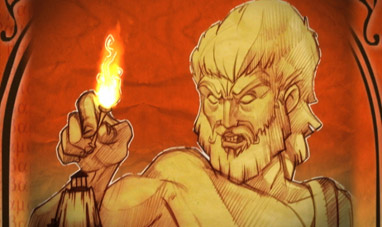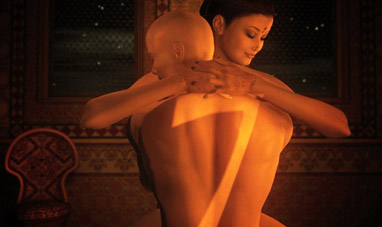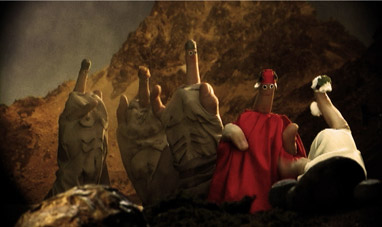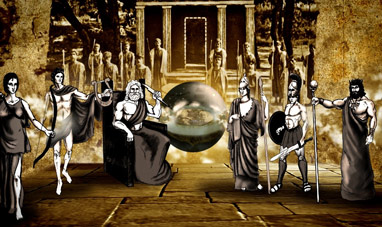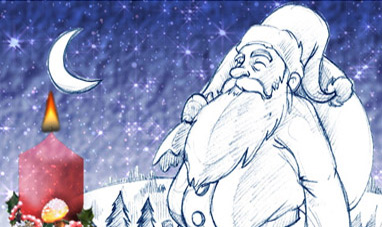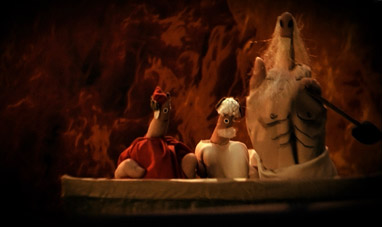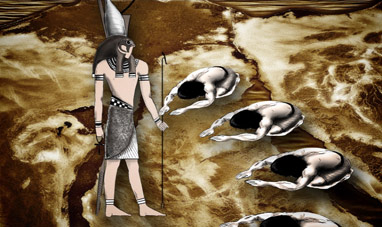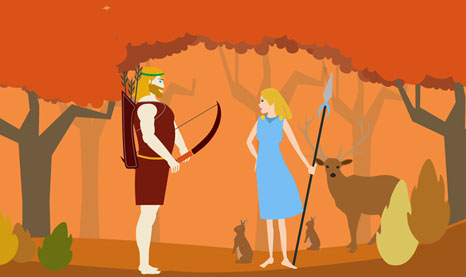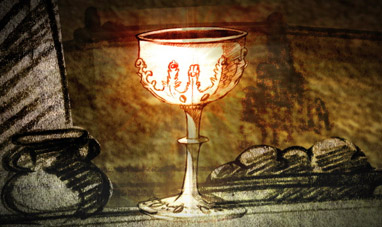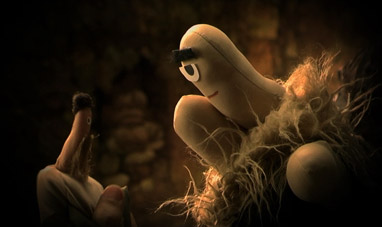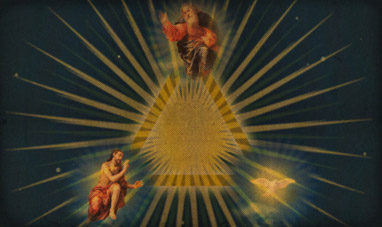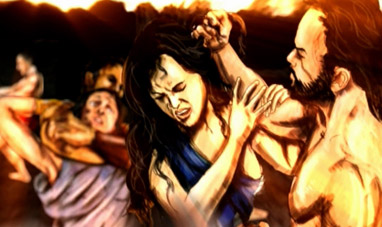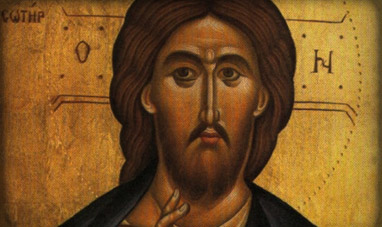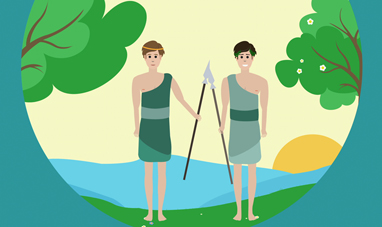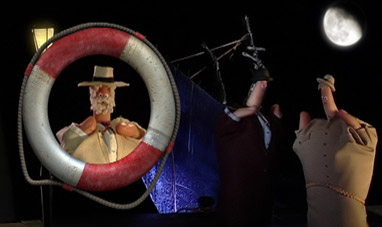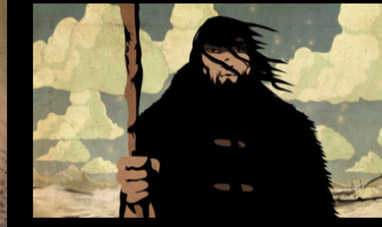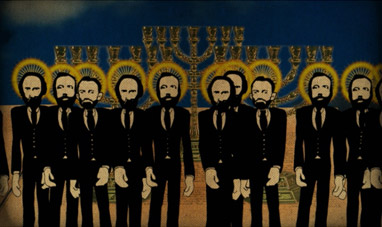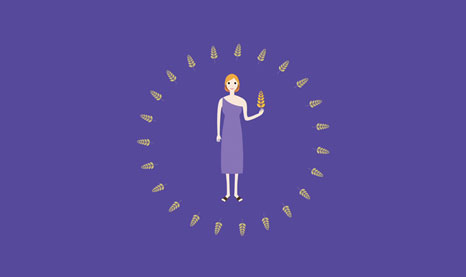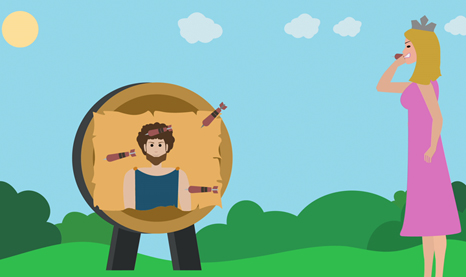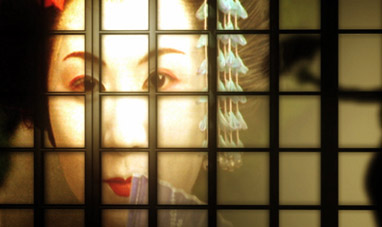In Greek mythology, Oedipus is the King of Thebes and the son of King Laius and Queen Jocasta.
His story has come to us from a number of Greek and Latin tragedies by authors like Sophocles, Euripides, Aeschylus and Seneca. The most famous version is Sophocles’ Oedipus the King. Before Oedipus’ birth, an oracle tells Laius, the King of Thebes, that terrible misfortune will come from his son. According to the prediction, Oedipus will kill Laius.
Terrified, Laius orders a servant to kill the newborn child. The servant disobeys him, handing Oedipus over to shepherds who carry him to Polybos, the King of Corinth. Oedipus grows up in Corinth believing he is the son of Polybos.
One day a drunk man tells Oedipus he is not Polybos’ son. Distraught, Oedipus demands an explanation from the king. Polybos assures him that he is really his father. Oedipus does not believe him and asks the priestess Pythia.
Pythia does not answer his question, but predicts a terrible fate, "You will kill your father and marry your mother."
Convinced that Polybos is truly his father, Oedipus leaves Corinth to avoid killing him. During his travels, Oedipus meets Laius, who orders him to step aside in deference to his superior. Oedipus replies that his only superiors are the gods and his parents. Furious, Oedipus kills Laius. He has fulfilled part of the horrible prophecy.
In Thebes, Oedipus solves the riddle of the Spinx, a monster that devours anyone who cannot answer its questions. Until then, no one had been able to solve the riddle. As a reward, Oedipus becomes the King of Thebes and marries Queen Jocasta. Without knowing it, Oedipus marries his mother.
A dreadful plague strikes Thebes. Oedipus returns to Pythia to find a solution. The priestess tells him the plague will cease when King Laius’s killer is found. To find the culprit, Oedipus turns to prophet Tiresias. Tiresias reveals to Oedipus that he himself is the killer.
Offended, Oedipus accuses him of bad faith and wickedness. To placate Oedipus, Jocasta intervenes. To prove that the latest oracles are worthless, she recounts the prophecy Laius had been told. The ignorant woman says it was never fulfilled.
Jocasta’s words fill Oedipus with dread. He asks where and when Laius was killed. Oedipus realizes that he has killed his father and married his mother. The prophecy has been fulfilled. Horrified, Jocasta hangs herself. To atone for his sins, Oedipus blinds himself with his mother’s brooch. The tragedy of Oedipus represents the crisis of human rationality. Oedipus has complete confidence in reason. He solves the riddle of the Sphinx and seeks a remedy for the plague afflicting Thebes. He is, however, blind to reality. By blinding himself, Oedipus becomes a symbol of the surrender of reason.
His story has come to us from a number of Greek and Latin tragedies by authors like Sophocles, Euripides, Aeschylus and Seneca. The most famous version is Sophocles’ Oedipus the King. Before Oedipus’ birth, an oracle tells Laius, the King of Thebes, that terrible misfortune will come from his son. According to the prediction, Oedipus will kill Laius.
Terrified, Laius orders a servant to kill the newborn child. The servant disobeys him, handing Oedipus over to shepherds who carry him to Polybos, the King of Corinth. Oedipus grows up in Corinth believing he is the son of Polybos.
One day a drunk man tells Oedipus he is not Polybos’ son. Distraught, Oedipus demands an explanation from the king. Polybos assures him that he is really his father. Oedipus does not believe him and asks the priestess Pythia.
Pythia does not answer his question, but predicts a terrible fate, "You will kill your father and marry your mother."
Convinced that Polybos is truly his father, Oedipus leaves Corinth to avoid killing him. During his travels, Oedipus meets Laius, who orders him to step aside in deference to his superior. Oedipus replies that his only superiors are the gods and his parents. Furious, Oedipus kills Laius. He has fulfilled part of the horrible prophecy.
In Thebes, Oedipus solves the riddle of the Spinx, a monster that devours anyone who cannot answer its questions. Until then, no one had been able to solve the riddle. As a reward, Oedipus becomes the King of Thebes and marries Queen Jocasta. Without knowing it, Oedipus marries his mother.
A dreadful plague strikes Thebes. Oedipus returns to Pythia to find a solution. The priestess tells him the plague will cease when King Laius’s killer is found. To find the culprit, Oedipus turns to prophet Tiresias. Tiresias reveals to Oedipus that he himself is the killer.
Offended, Oedipus accuses him of bad faith and wickedness. To placate Oedipus, Jocasta intervenes. To prove that the latest oracles are worthless, she recounts the prophecy Laius had been told. The ignorant woman says it was never fulfilled.
Jocasta’s words fill Oedipus with dread. He asks where and when Laius was killed. Oedipus realizes that he has killed his father and married his mother. The prophecy has been fulfilled. Horrified, Jocasta hangs herself. To atone for his sins, Oedipus blinds himself with his mother’s brooch. The tragedy of Oedipus represents the crisis of human rationality. Oedipus has complete confidence in reason. He solves the riddle of the Sphinx and seeks a remedy for the plague afflicting Thebes. He is, however, blind to reality. By blinding himself, Oedipus becomes a symbol of the surrender of reason.





